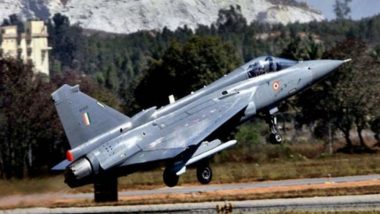New Delhi, August 24: India’s Light Combat Aircraft Tejas will now be 20 percent lighter. Council of Scientific and Industrial Research - National Aerospace Laboratory (CSIR-NAL) has developed a technology for manufacturing carbon components. The CSIR-NAl’s technology uses an indigenously developed carbon fibre, mixed in with an organic resin for making complex parts like fin, rudder, wing spars and fairings in a single mould.
“For making the composite material, this pre-impregnated carbon fibre is autoclaved or treated under extreme heat and temperature. The autoclaving technology has also developed by our lab,” reported Hindustan Times quoting Jitendra Jadhav, director of CSIR-NAL. The material was moulded into complex components of the aircraft which reduces the number of parts used in the fighter jet by 40 percent and the number of fasteners needed to assemble it by 50 percent.
The entire process of assembling the aircraft will be reduced by 30 percent since most of the components are built as singular structures. The structures produced by this technology are stronger and have more resistant. The composite technology is important of the fourth generation fighter aircraft.
According to a report published by Hindustan Times, the laboratory has received an order for 20 sets of parts for the aircrafts worth more than Rs 100 crore from the Hindustan Aeronautics Limited (HAL). CSIR-NAL has also transferred the technology to manufacturing partner Tata Advanced Materials Limited (TAML), Bengaluru. According to the report, the project began with two technology demonstrator aircraft and then five prototype aircraft.
Indeginoiously built Tejas inducted into the Indian Air Force (IAF) on 1 July 2016. In April this year, the aircraft successfully fired its Beyond Visual Range (BVR) air-to-air missile.
(The above story first appeared on LatestLY on Aug 24, 2018 06:44 PM IST. For more news and updates on politics, world, sports, entertainment and lifestyle, log on to our website latestly.com).













 Quickly
Quickly


